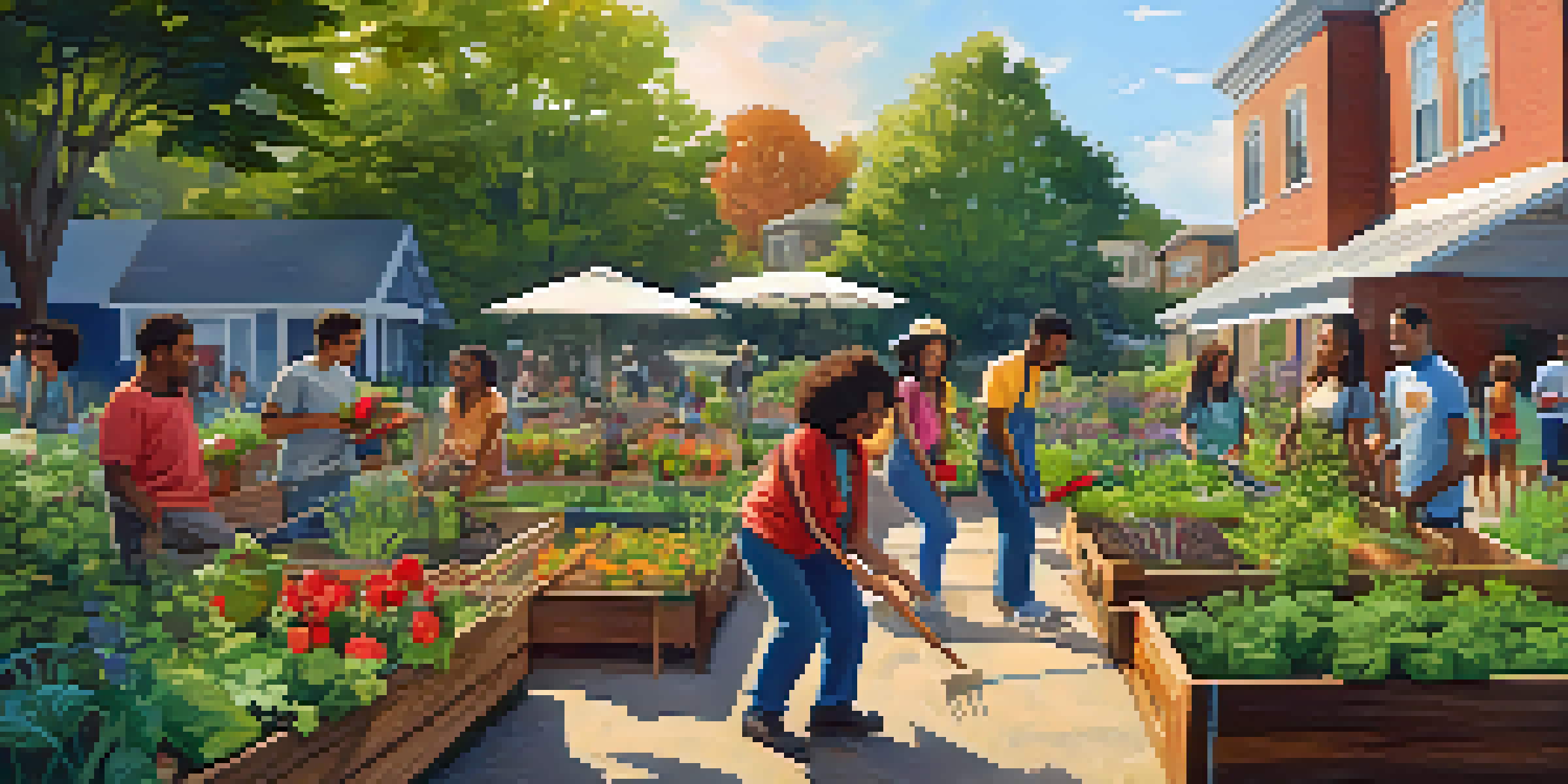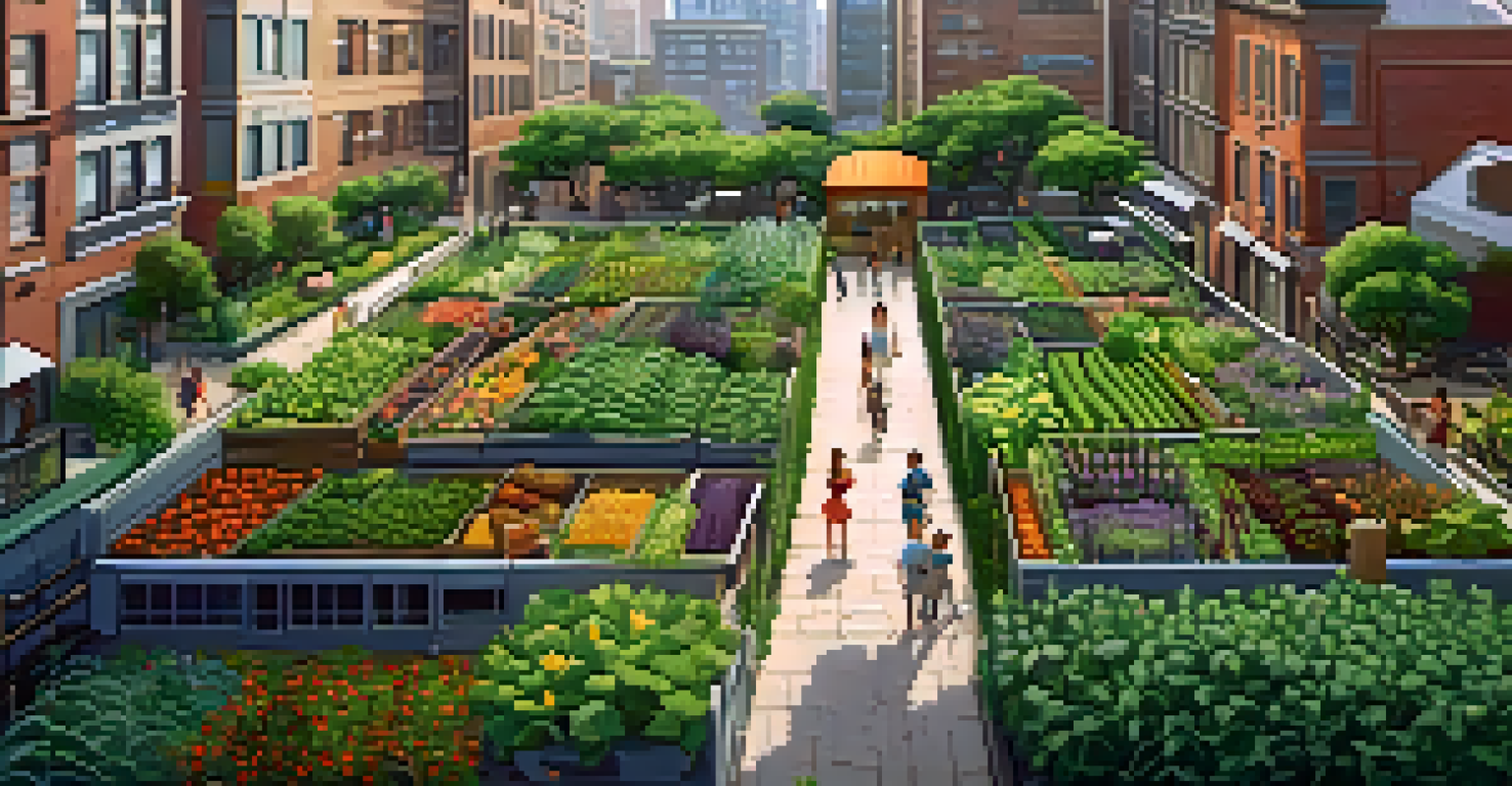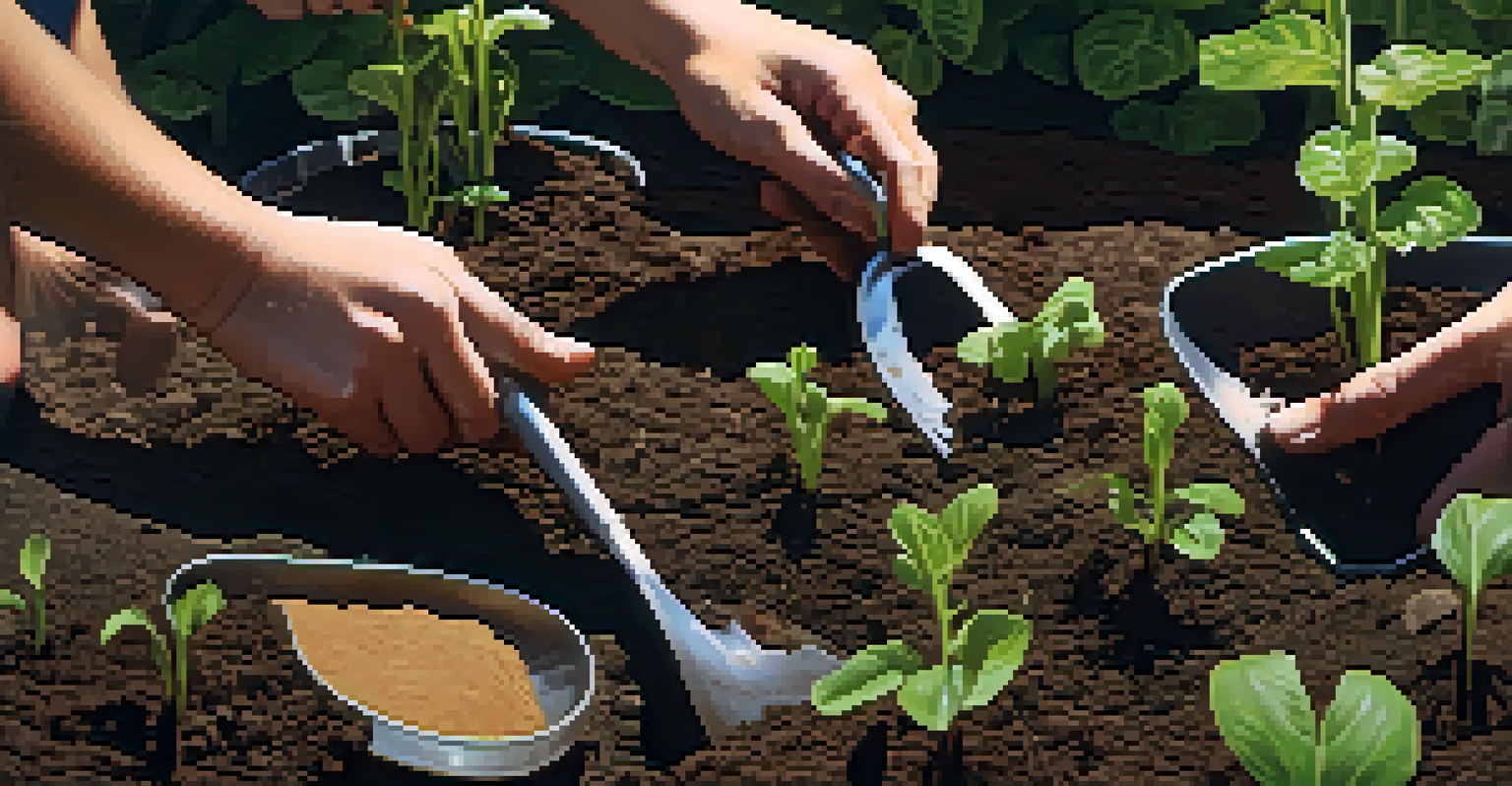The Impact of Urban Gardens on Health in Los Angeles Communities

Understanding Urban Gardens and Their Purpose
Urban gardens are green spaces created within city environments, often transforming vacant lots or underutilized areas into vibrant gardens. These spaces provide a platform for growing fresh produce, promoting sustainable practices, and fostering community connections. In Los Angeles, where food deserts exist, urban gardens serve as a lifeline for many residents seeking fresh fruits and vegetables.
The creation of urban gardens is not just about growing food; it’s about growing a community.
Beyond just growing food, urban gardens can also act as educational hubs. They offer workshops on gardening techniques, nutrition, and environmental stewardship, empowering community members with vital knowledge. This hands-on learning experience can inspire a new generation to prioritize health and sustainability.
Furthermore, urban gardens can help beautify neighborhoods, turning bleak areas into welcoming spaces. This transformation can instill pride among residents, encouraging them to care for their environment and each other, ultimately enhancing community bonds.
The Mental Health Benefits of Urban Gardening
Engaging with nature has been shown to have significant mental health benefits, and urban gardens provide just that opportunity. They offer a serene escape from the hustle and bustle of city life, allowing individuals to unwind and connect with their surroundings. Spending time in a garden can reduce stress, anxiety, and even symptoms of depression.

Moreover, urban gardening fosters a sense of purpose and accomplishment. When individuals nurture plants and witness their growth, it can boost self-esteem and provide a rewarding experience. This sense of achievement can be particularly beneficial for those facing mental health challenges, giving them a constructive outlet.
Urban Gardens Enhance Community Wellness
Urban gardens not only provide fresh produce but also foster mental health, physical activity, and social connections among community members.
Additionally, the social aspect of urban gardens can combat feelings of isolation. Community members often come together to garden, share experiences, and support one another, creating a strong network of relationships that promote emotional well-being.
Promoting Physical Health Through Gardening
Physical activity is vital for maintaining health, and urban gardening encourages movement in a fun and engaging way. Whether it's digging, planting, weeding, or harvesting, gardening provides a full-body workout that can enhance physical fitness. For many, it’s a delightful alternative to traditional exercise routines.
Gardening adds years to your life and life to your years.
Gardening also promotes healthier eating habits by making fresh produce more accessible. When people grow their own fruits and vegetables, they are more likely to incorporate these nutritious foods into their diets. This shift can lead to improved overall health, reducing the risk of diet-related diseases.
Moreover, urban gardens can serve as a source of community resilience during food shortages. By cultivating their own food, communities can mitigate food insecurity, ensuring that everyone has access to healthy options, which is especially important in urban settings like Los Angeles.
Fostering Community Connections Through Urban Gardens
Urban gardens are more than just places to grow food; they are vital community hubs that foster connections among diverse groups. They encourage collaboration and teamwork, as residents come together to plant, maintain, and harvest. This collective effort can break down barriers and promote inclusivity.
Through shared experiences in the garden, individuals from different backgrounds can learn from one another and celebrate cultural diversity. For example, community members might share traditional recipes or gardening techniques passed down through generations, enriching the community’s knowledge and appreciation for various cultures.
Addressing Food Insecurity Locally
By growing food in urban gardens, communities can combat food insecurity, especially in food deserts, ensuring access to nutritious options for all.
These connections can lead to stronger neighborhood ties, as residents feel more invested in the well-being of their community. As relationships deepen, community members are more likely to support one another, leading to a safer and more cohesive environment.
Urban Gardens as Educational Platforms
Urban gardens serve as excellent educational platforms for all ages, offering hands-on experiences that teach valuable skills. Schools and community organizations often partner to create programs that introduce children to gardening, nutrition, and environmental conservation. These lessons can inspire lifelong habits of sustainability and healthy living.
For adults, workshops and classes held in urban gardens can cover a range of topics, from composting to cooking demonstrations. Participants can learn practical skills that not only benefit their health but also contribute to a more sustainable community. This ongoing education can empower individuals to make informed choices about their food and environment.
Additionally, urban gardens can provide research opportunities for local universities and organizations, allowing students and professionals to study the impacts of gardening on health and community dynamics. This collaboration can yield valuable insights that further enhance the role of urban gardens in Los Angeles.
Addressing Food Insecurity with Urban Gardens
Food insecurity remains a pressing issue in many Los Angeles neighborhoods, particularly in areas classified as food deserts. Urban gardens can play a crucial role in alleviating this problem by providing fresh, nutritious food directly to communities in need. They can be a reliable source of produce for families who may not have easy access to grocery stores.
By creating community gardens, residents can collaborate to grow food collectively, ensuring that everyone benefits from the harvest. This cooperative approach not only addresses food scarcity but also builds a sense of shared responsibility and community spirit.
Sustainable Practices in Urban Spaces
Urban gardens promote environmental sustainability through biodiversity, organic gardening, and reduced carbon footprints in food production.
Moreover, urban gardens often partner with local organizations to distribute surplus produce to food banks and community kitchens, widening their impact. This outreach ensures that even those who may not have the means to participate in gardening directly can still enjoy the benefits of fresh, healthy food.
Sustainability and Environmental Impact of Urban Gardens
Urban gardens contribute to environmental sustainability by promoting biodiversity and reducing urban heat. By incorporating various plants, these gardens can create habitats for pollinators like bees and butterflies, which are essential for a healthy ecosystem. This biodiversity can enhance the resilience of urban areas against climate change.
Additionally, urban gardens utilize sustainable practices such as composting and organic gardening, minimizing the need for chemical fertilizers and pesticides. This not only benefits the health of the garden but also promotes cleaner air and water in the surrounding community.

Furthermore, urban gardens can reduce the carbon footprint of food production by shortening the distance food travels from farm to table. By growing food locally, communities can decrease reliance on industrial agriculture, leading to a more sustainable food system.